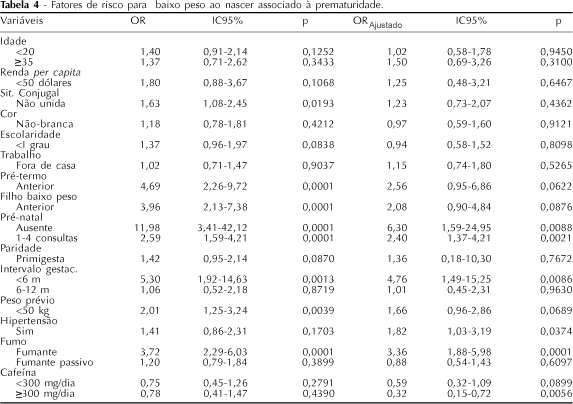OBJECTIVES: To assess the association between maternal caffeine consumption during pregnancy and low birth weight, prematurity and intrauterine growth retardation. METHODS: A case-control was carried out and 354 newborns of single labor with birthweight <2,500 g (cases) and 354 with birthweight >3,000 g (controls) were analyzed. Caffeine consumption was calculated based on daily consumption of coffee, soft drinks and tea. Results were adjusted using multiple logistic regression for the following confounders: mother's age, schooling, income, marital status, skin color, parity, smoking, previous low birthweight children, mother's pre-pregnancy weight, employment status, interval between pregnancies, prenatal care and high blood pressure. RESULTS: For caffeine consumption <300 mg/day and >300 mg/day, the adjusted odds ratios for low birthweight were: 0.72 (95%IC=0.45-1.25) and 0.47 (95%IC=0.24-0.92); prematurity: 0.59 (95%IC=0.32-1.09) and 0.32 (95%IC=0.15-0.72); and intrauterine growth retardation: 1.16 (95%IC=0.45-3.01) and 0.64 (95%IC=0.20-1.98), respectively. CONCLUSION: There was no association between caffeine consumption during pregnancy and low birthweight, prematurity and intrauterine growth retardation.
Food consumption; Caffeine; Infant, low birthweight; Infant, premature; Fetal growth retardation





